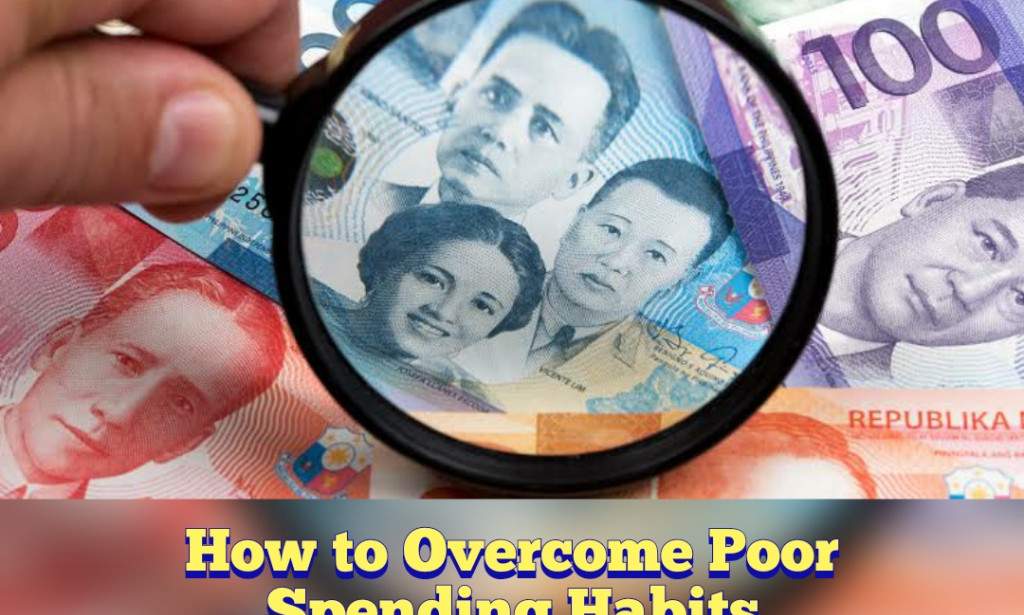How to Overcome Poor Spending Habits

Overcoming bad spending habits and improving financial well-being can be challenging but entirely achievable with dedication and discipline. Here are some steps to help you overcome bad spending habits that may be contributing to poverty in your life:
1. Assess your current financial situation: Take an honest look at your income, expenses, and debts. This will help you understand your financial reality and identify areas where you may be overspending or making poor financial choices.

2. Create a budget: Develop a realistic budget that outlines your income and expenses. Be sure to prioritize essential expenses such as housing, utilities, food, and transportation. Allocate a portion of your income to savings and debt repayment. By sticking to a budget, you can gain control over your spending and prevent unnecessary expenditures.
SPONSORED

Transparent Backpack PVC Bag Knapsack
Product Price: ₱700
Discount Price: 👉
🛒 SHP: https://go.shopple.co/sps25h
🛒 LAZ: https://s.lazada.com.ph/s.7OUTd?cc
Follow our official 🛒 store @
🔗 https://shopple.co/Lex-curiae

3. Track your expenses: Keep a record of every expense, big or small, over a certain period (such as a month). This will help you identify patterns and understand where your money is going. Tracking expenses can also act as a deterrent and make you more conscious of your spending decisions.

4. Identify and eliminate unnecessary expenses: Analyze your expenses and identify areas where you can cut back. This may include reducing entertainment and leisure expenses, eating out less frequently, or reviewing and reducing subscription services. Eliminating unnecessary expenditures can free up funds to pay off debt or build savings.

5. Establish financial goals: Setting clear financial goals can help motivate you to change your spending habits. Determine what you want to achieve, such as building an emergency fund, paying off debts, or saving for a specific purchase. Having tangible targets can provide focus and help you make more intentional spending decisions.

6. Practice delayed gratification: Avoid impulsive purchases and learn to postpone non-essential purchases. Give yourself a cooling-off period before making any significant purchases to ensure they are well-considered and align with your financial goals.

7. Seek support and education: Find resources that can help you improve your financial literacy. Utilize online tools, books, or courses that provide insights into budgeting, saving, and investment strategies. Additionally, consider working with financial professionals or seeking advice from reputable credit counseling agencies.
8. Build an emergency fund: Allocate a portion of your income towards an emergency fund to cover unexpected expenses. Having savings for emergencies can prevent you from resorting to high-interest loans or credit card debt when faced with unexpected financial burdens.
9. Address emotional spending triggers: Understand and reflect on any emotional triggers that may contribute to overspending. Many people use retail therapy or impulsive buying as a coping mechanism for stress, boredom, or other emotional challenges. Recognize these triggers and find healthier alternatives, such as exercising, practicing mindfulness, or seeking support from friends or professionals.
10. Practice self-discipline and accountability: Changing spending habits require discipline and consistency. Stay committed to your financial goals, hold yourself accountable, and regularly review your progress. Celebrate small victories along the way to stay motivated.
Remember, changing spending habits takes time and effort. Be patient with yourself and stay focused on your long-term financial well-being. Seek support from friends, family, or financial experts as you work towards overcoming bad spending habits and building a more secure financial future.



You must be logged in to post a comment.